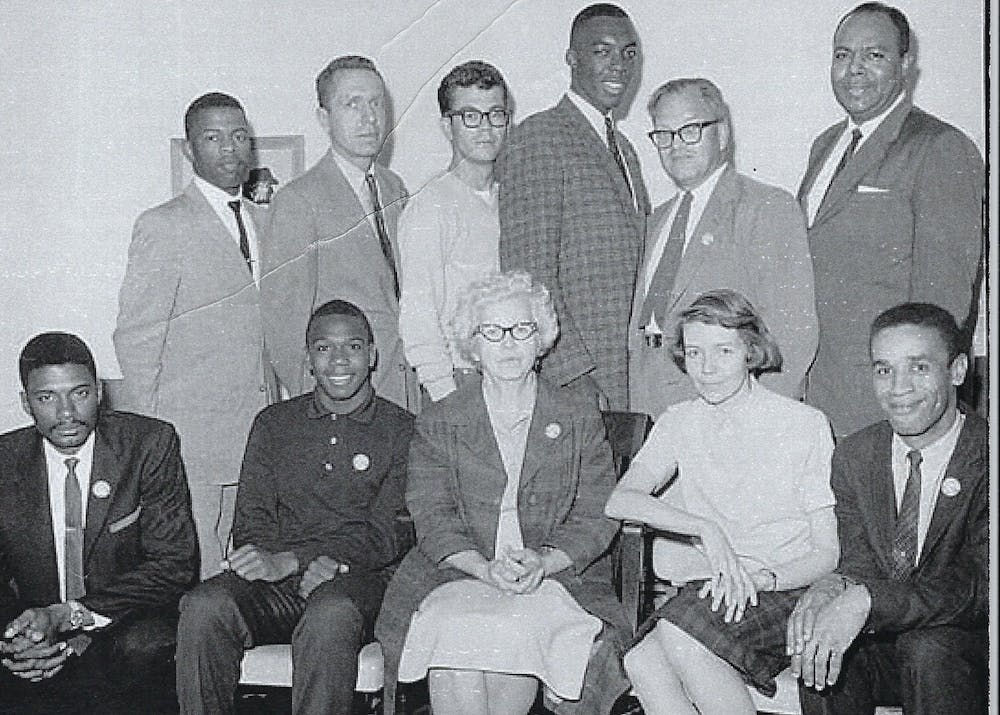David Dennis, from Omega, Louisiana, wasn't interested in the civil rights movement — his "idea was to go to college and graduate." Then he met a girl he wanted to impress.
Dennis, now a South Carolina resident, attended a meeting, went to sit-ins and picketed for the first time — which, when he showed up to the wrong place, resulted in jail time.
When he sat in on a meeting discussing the continued runs of the Freedom Rides, “everything began to make sense.” The Freedom Riders wanted to end segregation on interstate transportation.
“I heard this voice that said, ‘There’s not enough space in this room for both God and fear.' For whatever the reason is, everything began to make sense, so it just sort of collapsed on me,” Dennis said. “So from that point on, it changed from my just being a part of something without clear understanding. That’s when real commitment emerged."
Dennis was one of three civil rights activists who participated in a panel as a part of the College of Arts and Sciences' new justice-themed semester and ongoing projects at the Center for Civil Rights History at USC. They reflected on their time as Freedom Riders in 1961 and active members of the civil rights movement.
Charles Pearson was one of the first 13 Freedom Riders. Pearson first got involved in the civil rights movement in 1960 during his freshman year at Morehouse College, a historically Black college in Georgia.
Pearson went to Washington, D.C., to prepare for the Freedom Rides. He said his “greatest expectation” of danger included how “[people] might even spit on us or even put a cigarette out on us.” It wasn’t until Pearson traveled that he realized the true dangers of being in the movement.
“Something was going to happen if you were a Freedom Rider. You were either going to get beat up, your bus may be burned or you may be incarcerated. Yet they came, and they continued to come,” Pearson said.
During Pearson’s time on the Freedom Ride, he passed through Columbia and a few other cities in South Carolina, with most of the journey passing without conflict.
“Our trip was well-planned because every evening we had dinner together and we discussed what happened that day and what went well and what didn’t go well, and then we found out where we were going to stay,” Pearson said.
Rock Hill, South Carolina, was one of the places where a group of Freedom Riders — including future congressman John Lewis — were met with resistance and assaulted.
“The police in Rock Hill got there just as the beating was being concluded, and they asked the Freedom Riders if they wanted to press charges. And John Lewis was one of those riders, and he says, ‘No, we’re not here to punish individuals. We’re here against the system of segregation,'” Pearson said. “It obviously had an impact on those men because several years later, one of those men did apologize to John Lewis, and that’s the only case that I know of where someone who had beaten a Freedom Rider actually apologized."
When he was in the middle of the Freedom Rides, Dennis said he realized there was no turning back, and he was fully committed to the movement for life.
“We talked about life, death, and we knew that’s what we were facing at this point. The kids from Nashville, Tennessee, they were writing wills. Kids from New Orleans, we didn’t understand that because we didn’t have enough to talk about writing a will, so we weren’t part of that discussion because all we had to give was love, except the clothes on our back,” Dennis said.
Joan Browning attended Georgia State College for Women. After the African American Methodist Church near her campus was threatened with being burnt down, Browning learned more about the movement and participated in numerous sit-ins. She knew these sit-ins could be dangerous and were not to be taken lightly.
“A Ku Klux Klan member with a knife lunged towards Cecil [Hudson], and the Paine College student, whose name was Bill Didley, jumped in front of Cecil and got the knife that was sticking in his chest,” Browning said. "He still yelled for us to run, and so we'd said we'd do what we were told to do, and we did. We could look back and see him lying on the sidewalk with his blood puddling around him.”
Browning was one of nine people who got picked to go on a Freedom Ride from Atlanta to Albany, Georgia, on the Central Georgia Railroad Freedom Ride.
Browning said she believes the biggest takeaways from the civil rights movement include using "the moral authority of nonviolence." Participants in the demonstrations were tested to see if nonviolence could be maintained, no matter what was thrown at them, including hot coffee being poured on them.
“The only reason so many of us survived the movement is that we had the moral authority of nonviolent civil disobedience," Browning said. "First of all, we were asking for things that were reasonable for any citizen to have, like to sit wherever you wanted to on a bus or eat at a lunch counter; go to a public library."
To Browning, the civil rights movement is seen as the "birth" of citizen activism. Before the pandemic, Browning visited fifth grade classes to encourage students to take matters into their own hands.
“I hope that it inspires them to feel empowered, to get together and make some changes, or make some good trouble," Browning said.
Ultimately, being a Freedom Rider was impactful on Browning, and she said it helps her when she loses hope.
“That’s been my identity all these years is — I’m a Freedom Rider. When I was going to be buried, I wanted to put on my tombstone: Joan Browning, Freedom Rider."

